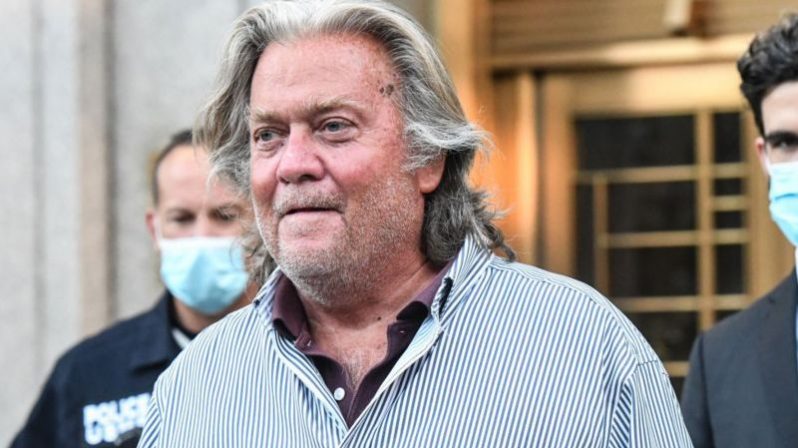(BBC) – Former Trump strategist Steve Bannon has been charged with contempt of Congress after refusing to give evidence about the US Capitol riot.
He was summoned to testify on what he knew about plans for the protest that ended with the storming of Congress.
The House of Representatives voted last month to send the case to the justice department, which opted on Friday to prosecute Mr Bannon, 67.
He could face up to a year in prison and a $100,000 (£74,500) fine.
Trump supporters raided the US Congress building on 6 January as lawmakers were meeting to certify the election result.
Mr Trump, a Republican, has refused to acknowledge losing the election to Democratic President Joe Biden last year, making claims – without evidence – of mass voter fraud.
This was the first such indictment to come out of the House of Representatives Select Committee’s inquiry of the 6 January invasion of the Capitol complex.
One of the contempt counts against Mr Bannon is linked to his refusal to appear for a deposition and the other is for his refusal to produce documents for the committee.
The political advisor – who was fired from the White House in 2017 but remained loyal to former President Donald Trump – is expected to surrender to authorities on Monday, when he will appear in court.
In a statement released on Friday, US Attorney General Merrick Garland said the indictment reflected the justice department’s “steadfast commitment” to the rule of law.
Subpoena documents quote Mr Bannon – who currently hosts the right-wing War Room podcast – as saying on the eve of the riot that “all hell is going to break loose tomorrow”.
The 67-year-old’s lawyers argued that his communications involving the former president were protected.
Mr Trump has urged his former aides to reject all requests to submit to depositions. He argued they have the right to withhold information because of executive privilege – a legal principle that protects many White House communications.
The US Court of Appeals in Washington is scheduled to hold a hearing at the end of this month to rule on Mr Trump’s claim of executive privilege after it was rejected by a lower court.
The former president is also attempting to block a trove of phone records, visitor logs and other White House documents that congressional investigators are chasing for their Capitol riot inquiry.
President Biden has argued that executive privilege does not apply in this case.
Contempt of Congress cases are notoriously difficult to litigate.
The last successful prosecution was in 1974, against a conspirator in the Watergate scandal that forced President Richard Nixon out of office.
If Mr Bannon is cleared it will not be his first scrape with the legal system. Before leaving office in January, Mr Trump pardoned Mr Bannon of charges that he had defrauded donors who gave money to fund the construction of a southern border wall.
Mr Bannon’s indictment came on the same day that Mark Meadows, a former White House chief of staff in the Trump administration, defied a similar subpoena to appear before the committee.
His lawyer said on Friday that Mr Meadows had a “sharp legal dispute” with the committee because of Mr Trump’s claims of executive privilege.
In a statement, committee chairman Bennie Thompson, a Mississippi Democrat, said that Mr Meadow’s decision “to defy the law” may force the committee to pursue contempt proceedings like those applied to Mr Bannon.
“It’s unfortunate that Mr Meadows has chosen to join a very small group of witnesses who believe they are above the law,” Mr Thompson said.
He added that efforts from Mr Meadows, Mr Bannon and others “won’t prevail in stopping the select committee’s effort getting answers for the American people about January 6th”.
The House Select Committee has issued dozens of subpoenas in the last week, calling on many former Trump officials to hand over documents and testify about the riot.
They include Kayleigh McEnany, the ex-White House press secretary, Stephen Miller, who was Mr Trump’s senior adviser, and Michael Flynn, former national security adviser.












